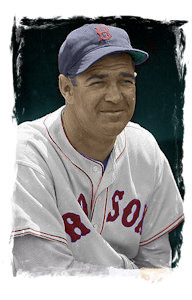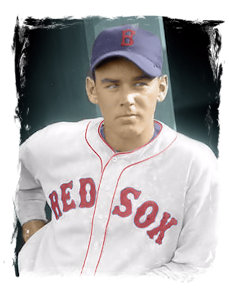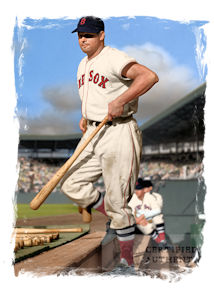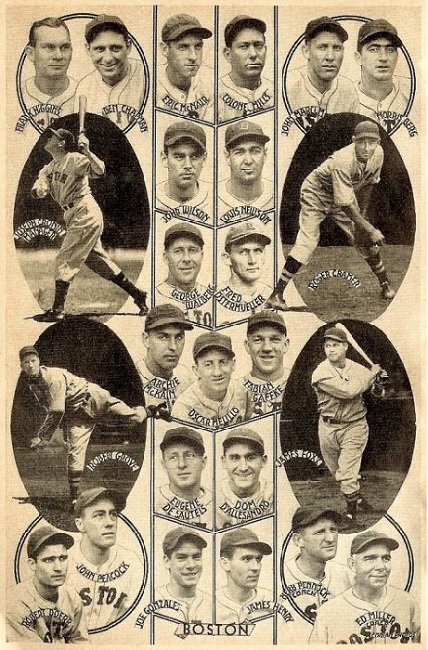|
The Red Sox since Tom Yawkey's purchase had only been a .500 team in spite of the millions of dollars he had spent. The players he had bought improved the team, but they were not going to contend for a championship. The problem was that there just weren't enough superstars to purchase in the decades before free agency. So, the Red Sox goal was to develop their own players through their farm system. They had groomed a few promsing rookies but knew it would take some time for the youngsters to develop. After the disappointment of the year before, Yawkey decided not to go out and purchase more of the other team's big stars in the off-season. The only significant move he made, was to dump the malcontent Billy Werber to the A's in exchange for Mike Higgins. He also sold off utility player John Kroner to the Indians and Babe Dahlgren to the Yankees. When the Sox moved down for spring training, Joe Cronin did not project himself to be a starter. Higgins was at third base, Eric McNair was at short and 18 year old Bobby Doerr was given a shot at second base. Jimmie Foxx was at first base while Doc Cramer shared the outfield with rookies Buster Mills and Fabian Gaffke, but Dom Dallessandro and Mel Almada did their parts as well. Only two reliable pitchers were on the roster in Lefty Grove and Wes Ferrell. The surprise of the camp was the Bobby Doerr, who had already put in three seasons of play in the Pacific Coast League and batted .342 in his final year. His promotion meant a changing of the guard, as the older veterans were being replaced by the younger players. Doerr had idolized Cronin as a teenager and was thrilled when his hero took him under his wing. It was a perfect match. Success came realtively easy for Doerr and he handled it with grace and modesty. He never coveted anything that was not his. He was respectful of everyone and while he loved playing baseball and was hansomely rewarded for it, he did not let it distroy his values. He always knew it was just a game with limits to its social value. The bad news coming out of camp concerned Jimmie Foxx, who had taken ill at the end of March with pneumonia and was hospitalized for ten days. He returned in April but never really got his strength back to where it was. After the 1936 season ended, Eric McNair and his wife were looking forward to the arrival of their first child. Tragedy struck them in January, when McNair’s wife Mildred, died of pneumonia and complications attendant on childbirth, nine days after their son Donald Eric Jr. was born. McNair floundered in his grief during spring training with his depression, forcing Cronin to put himself back at shortstop. The Cronins however had to deal with their own tragedy. Mildred Cronin lost their newly born twins in Sarasota on April 7th, almost dying herself. Joe Cronin stayed behind to care for his wife when camp broke. When he was sure that his wife was out of the woods and in the care of her own family, he came north in time for the season opener.
Breaking in on the same April 20th date as two other Red Sox, second baseman Bobby Doerr and third baseman Mike Higgins, Buster Mills played right field and was 2-for-4 with a triple as the Sox beat the A's in Philadelphia, 11-5. Cronin contributed two doubles and a single. Lefty Grove pitched the home opener against the Yankees on April 24th. He pitched just six innings and was taken out for a pich hitter, with the Sox being shut-out losing 3-0. The Sox rallied however, tied the game in the bottom of the sixth, but lost in the tenth, 6 to 5. Grove had pitched with pinpoint accuracy according to his catcher, Gene Desautels, who claimed that just about every pitch hit his catcher's mitt without him having to move it more than an inch. At Fenway on April 26th, Doc Cramer starred at bat and in the field, leading the Sox over Washington, 12-5. He got three hits including a triple, and made some circus catches on a very windy day. After three straight rain-out the Sox finally took the field against the A's at Fenway to end the month. The layoff didn't hurt the bats, as the demolished Philly, 15 to 5 on April 30th. A three-run homer by Jimmie Foxx, a two-run blast by Wes Ferrell, along with four singles from Joe Cronin highlighted the afternoon.
The Sox traveled to St. Louis and beat the Browns with an 18 hit attack on May 4th, running away to an 11-6 victory. Doc Cramer, Cronin and Rick Ferrell each collected three hits. On May 6th, the day the Hindenburg crashed and burned in Lakehurst, NJ, the Sox beat the Browns in St. Louis. A fourth inning outburst, in which three of the Sox eight hits were recoded, Johnny Marcum won his third straight game without a defeat and a 2-1 win. In Cleveland, Marcum made his record 4-0 on May 11th. Foxx homered and doubled to drive in four runs, leading the Sox to an 11 to 4 win. On May 16th, Eric McNair singled in the 12th inning, to break a 5-5 tie in Washington. He brought home Foxx with the deciding run and a 6 to 5 win. Archie McKain got his first major league win after pitching shut-out ball over the last four innings. The Sox returned to Fenway after winning five games of the 12-game road trip. Upon returning home the Red Sox lost four of their first five games, but went on to winning five straight games. Against the White Sox on May 24th, the Sox pasted the visiting White Sox by a score of 9 to 5. A four run rally in the fifth inning, in which Foxx connected for a homer, and both Rube Walberg and Buster Mills slammed doubles, put the game away. Against the St. Louis Browns the next day, the Sox got enough runs in the first inning to win the game. Then Lefty Grove hit the corners all game and had the Browns hitters on their heels, giving up six hits and winning 4 to 2. Foxx had three hits, including another home run, in the next game against the Browns. The Sox banged out 17 hits, winning 11 to 9. The next win came on the arm of Johnny Marcum on May 28th, who shut out Washington 7 to 0 on six hits. The next day, the Sox came from behind scoring two runs in the seventh and one run in the eighth inning, 4 to 2, to win their fifth straight game. The Sox (16-15) finished the month having played .500 ball, winning 13 and losing 13. They were five games out, in fourth place. Joe Cronin was their spark plug for the month, batting over .400 at one point. He was also solid in the field and the criticism from the press and his teammates had stopped. Bobby Doerr however had been hit in the head by a pitch in late April and was batting so poorly, he had to be benched. Eric McNair took over at second for the rest of the season and played well.
In St. Louis, Foxx. McNair, Higgins and Buster Mills each collected three hits in an 11 to 4 runaway win over the Browns on June 5th. But Mills had a double and a homer, driving in three runs. The Cleveland Indians held an easy victory slip away from them on June 8th. Leading 8-2 going into the ninth inning, the Red Sox rallied with seven successive hits, good for eight runs and a 10-8 come-from-win. Bobby Doerr started the rally with a walk. Then Buster Mills, Mel Almada and Joe Cronin singled. Next Jimmie Foxx and Eric McNair doubled. Mike Higgins singled and Fabian Gaffke doubled, before Gene Desautels sacrifice bunted. Finally, Wes Ferrell lofted a sac fly to score Gaffke with the eighth run, before Mills grounded out to end the assault. Hot starts by Joe Cronin, Rick Ferrell and Lefty Grove were negated by the poor performances of Bobby Doerr, Wes Ferrell and Jimmie Foxx. As a result the team was only playing .500 ball.
On June 10th the Sox said good-bye to Rick Ferrell, Wes Ferrell and Mel Almada in a trade with Washington for outfielder Ben Chapman and pitcher Bobo Newsom. The big part of the deal was for Rick Ferrell (.308 BA) for Ben Chapman (.300 BA), an all-star outfielder, who was a strong right handed power hitter, but had been traded by the Yankees to Washington to make room for Joe DiMaggio. With a .302 batting average from 1933-37, Rick Ferrell had broken Red Sox catcher’s records in batting, home runs, doubles, and runs-batted-in. The feeling was that the young catcher Gene Desautels, along with Moe Berg, together would make up for his loss. Wes Ferrell had a slow start with a disappointing 3-6 record and a 7.73 ERA with a sore arm he would never recover from. Newsom had a few good years left but had a 3-4 record for Washington, so the exchange on paper, was considered a wash. Newsom was temperamental but Ferrell had also been a hot head who disliked Cronin. Since he was a troublemaker, he was easy for the manager to get rid of. Mel Almada was beaned in an April exhibition game and suffered a concussion. After he came back, he wasn’t being used much and became part of the trade as a throw-in, because Washington needed a utility infielder. The Sox (20-22) returned home and embarked on what would be, a successful homestand. It started with a four game sweep of the Chicago White Sox. On June 15th, Lefty Grove beat the White Sox, 5 to 1. The one run was unearned and Grove limited the visitors to seven scattered hits. The second game with the White Sox saw Bobo Newsom make his Sox debut. He won it 3 to 2 in a yo-yo type performance. He passed the first three batters he faced in the first inning, but got the next three on a pop-up and two strike outs. He then pitched no-hit ball until the sixth inning. He struck out eight batters, the last in the ninth inning with two men on base. The Sox finished the series by sweeping a doubleheader, 5-3 and 3-2 on June 17th. Jack Wilson won the opener on nine walks, but also only allowing five scattered hits. Wilson also led the Sox attack driving home two runs on a single and a double. The second game was a pitchers duel between Rube Walberg and Monte Stratton, until Ben Chapman scored Doc Cramer from second with a single in the bottom of the 10th inning, for a walk-off victory.
Moe Berg did some timely hitting, driving in two of the three runs the Red Sox had, in beating the Indians, 5 to 4, on June 18th. Down 4-3 in the eighth inning, the Sox rallied with one out. Mike Higgins singled over second and moved to third on a hit and run single to right by Oscar Melillo. He scored on Berg's bloop single in short center, and Dom Dallessandro's single to center scored Melillo with the go-ahead run. Jack Wilson gave up a walk and a single in the ninth, but got Earl Averill to hit into a game-ending doubleplay. Wilson pitched a masterly game on June 23rd against the Tigers. He also knocked in the deciding run to break a 5-5 tie in the eighth inning, thus winning his own game, 6 to 5. The next day, Grove pitched a shutout, beating Detroit, 9 to 0. Cronin led the offense with a triple and a home run, good for 4 RBIs. The Browns came into Fenway and faced Bobo Newsom on June 25th. Newsom won his third straight for the Sox since being traded, 4 to 2, holding St. Louis to four scattered hits, and walking just one. Two days later on June 27th, the Sox swept a doubleheader from the Browns. Jack Wilson won his third straight game with an 8-0 shutout. In the second game the Sox jumped out front, scoring ten runs in the first four innings, winning 11 to 7. It was their 11th win in the 13 game homestand.
The Sox made a quick trip down to Washington, where they lost two games, and then came home to continue their Fenway winning streak, by sweeping four straight from the Philadelphia A's. In the first game on July 2nd, the A's jumped out to a quick 3-0 lead, but the Sox battled back, winning 8 to 4. After they tied it up in the sixth inning, Buster Mills and Ben Chapman each homered and put the game on ice. They jumped out quickly to a 5-0 lead in the first inning of the next game and never looked back, piling up an 8 to 3 victory. Every member of the Sox lineup, except two, each had two hits. Mike Higgins led the way with a double and a triple. The Sox finished off Philly by sweeping a July 4th holiday doubleheader, but it wasn't easy. In the first game Jack Wilson's brilliant relief job pitching in the ninth inning, with the tying run on third and one out, allowed the Sox to squeeze out a 7 to 6 triumph. The second game was a 4 to 2 win after being halted in the eighth inning because of the 6:30 Sunday curfew. Archie McKain came in during the eight inning, with the bases loaded, and put out the fire. The Sox sat 5 1/2 games behind the Yankees and next went to New York, hoping to gain some ground, but it wasn't to be. The Bronx Bombers annihilated the Sox, 15-0 and 8-4. The All Star Game was played in Washington on July 7th and it was won by the American League, 8 to 3. The Yankees headlined the AL All Stars, with Lou Gehrig, Red Rolfe and Bill Dickey driving across seven of the runs. Joe Cronin started at shortstop and doubled to lead off the fifth inning, scoring on Dickey's double to center. Jimmie Foxx pinch hit for the pitcher and grounded out in the sixth. Lefty Grove and Doc Cramer were named to the team, but didn't get into the game. The Sox road trip continued in Philadelphia, seeing the Sox start another winning streak. On July 9th, Cronin's second overtime double, scored Ben Chapman in the 12th inning, to give the Sox a 12-11 victory over the A's. The next day, the Sox swept a doubleheader, 9-2 and 5-2. In the first game, Cronin knocked out two home runs in the win. In St. Louis on July 14th, the Sox rapped out 21 hits for 33 total bases and won 15-6. Fabian Gaffke doubled and tripled as part of his four hit game. Gene Desautels also banged out four hits as did Buster Mills, who also notched a homer. The three players drove in 10 runs and scored nine times. Jimmie Foxx led a hitting barrage in Detroit after losing five straight games. Lefty Grove (8-4) also pitched a great game in the 10-3 win on July 21st. Foxx belted two homers with a single, making a total of four home runs in his last two games. For the month, from June 15th to July 14th the Sox posted a 21-6 record but lost 1/2 game in the standings, because unfortunately the Yankees kept winning also. Over the next two weeks the Red Sox slumped and fell to 10 games behind New York, finishing the 20 game road trip winning 10 and losing 10. Upon returning to Fenway, the Sox embarked on another streak, winning 12 games and tying one, but only picked up one game on the Yankees. On July 28th, the Sox tried to give the game away by giving the St. Louis Browns two runs in the top of the ninth to erase a one-run lead. But they rallied back in the bottom of the ninth on a walk-off base hit by Eric McNair, to win 5 to 4. Jimmie Foxx blasted a two-run home run and an excellent relief performance by Jack Wilson, allowed the Sox to beat the Browns the next day, by a 5 to 3 count. Against the Tigers on July 30th, Wilson was brought in and pitched two no-hit innings in relief, but also brought in the winning run with a two out double in the tenth inning. The Sox beat Detroit 6 to 5 as Doc Cramer strolled home with the walk-off winning run. The Sox beat down Detroit in the next game by a 12-1 score. Led by Eric McNair's perfect 4-for-4, the Sox banged out 15 hits. They finished month going 18-12, in forth place, nine games out.
Lefty Grove chalked up his 250th career win when he beat the Cleveland Indians on August 3rd. The Sox rolled over the Tribe, 13-2 with Mike Higgins going 4-for-5, with two doubles and driving home four runners. The Red Sox had already won the first game of a doubleheader on August 4th with a score of 8 to 5. But they were losing the second game 5-4, with two outs and nobody on base, going into the bottom of the ninth inning of the second game. With runners on first and second, Joe Cronin hit a steaming line drive over Earl Averill's head in center, giving the Sox an exciting walk-off sweep of the afternoon, 6 to 5. Foxx had two home runs. He clocked a ball over the left field screen, off the roof of a house on Lansdowne Street and onto the railroad tracks, for his 28th home run of the season in the second game. Higgins had two home runs on August 6th, leading the Red Sox to a 7 to 3 win over the Chicago White Sox. Higgins was the hero the next day, August 7th, when he lined a bases-loaded ninth inning single into right, that scored Buster Mills, for a 5 to 4 walk-off win. The Sox and White Sox played a doubleheader the next day. The Red Sox won another thrilling game on a walk-off error by Chicago's secondbaseman Jackie Hayes. Down a run in the bottom of the ninth, once again the Sox rallied back. With Doc Cramer on base, Jimmie Foxx lined a triple to right center to tie the game. Ben Chapman then bounced a tricky grounder to Hayes, who bobbled it, letting Foxx score the winning run, 7 to 6. The Red Sox had come alive, played great ball, won 12 straight and moved up the standings into second place. But the Red Sox landed with a loud thud by losing the nitecap, 13-0.
The first place Yankees next came to Fenway for four games and took three of them, essentially ending the Sox pennant hopes. The highlight for the Sox came in the third game, where Sox batters racked up 16 runs. Foxx hit one of the longest home runs ever hit out of Fenway Park in the eighth inning. His 30th homer cleared the center field wall to the right of the flag pole, went over Lansdowne Street and landed approx 530 feet away on the low roof of one of the houses. Next, the Nationals beat the Sox four straight in Washington. With the bases loaded and two outs in the first inning on August 14th, Buster Mills camped under an “ordinary fly” and dropped it. Three runs scored and the Red Sox lost. Eric McNair proved to be a bright spot for the Sox on August 19th. He came off the bench in the eighth inning in Philadelphia and pinch hit a three run homer with two men on. The blast brought the Sox from behind for a 5 to 4 win over the A's. In Detroit, the Sox blotted out a four run lead by the Tigers and won 8 to 5 on August 27th. Jack Wilson won his 14th game, holding the opposition to five hits. Lefty Grove shut out the Tigers the next day 3-0, and Bobo Newsom shut out the Browns in St. Louis, the next day 2-0. The team never really recovered and went on to lose 13 of their next 17 games finding themselves out of the race, and falling to 15 1/2 games out by the end of the month.
Grove started September by tossing his second consecutive shutout. On September 1st he blanked the White Sox 2-0. He allowed only five hits in the six innings he pitched before the rains forced the cancellation of the remainder of the game. Buster Mills lined a single to left in the 10th inning of the second game of a September 4th doubleheader. Philadelphia A's pitcher George Caster had walked two men and Buster's single scored the winning run, 5 to 4. At Yankee Stadium on September 9th, the Red Sox twice came from behind to beat the Yanks 13 to 7. It was their first win in their last six games in New York and their first since May 2nd. Lefty Grove won his 15th of the season and fourth straight the next day, beating the Yankees 4-3. On September 11th the Red Sox beat the A's in Philadelphia by scoring eight runs in the ninth inning, to pull out a 13-6 victory. Ben Chapman's ninth inning three-run homer gave the Red Sox a 4-3 walk-off win against Detroit at Fenway on September 23rd. The Tigers had broken a 1-1 tie in the top of the inning, by scoring two runs. Wilson won his 15th game against the Yankees at Fenway, allowing the just five hits on September 26th. Foxx's homer, with Bobby Doerr aboard, was an important part of the 7-2 decision. The next day, Foxx slammed his 35th and 36th home runs in a 6 to 2 Sox win in Philadelphia. Fabian Gaffke homered in Washington on September 30th, as the Sox won the second game of a doubleheader, 9-3. It was his third homer in two days. The Sox finished with an 80-72 record and in fifth place at the end. His health problems brought the performance of Jimmie Foxx down dramatically. He went through homerless streaks of 16 and 24 games, and hit a mere .285, the lowest average of his career up to that date. He knocked out 36 homers with 127 RBIs and topped his Comiskey Park blast by hitting a ball out of Fenway Park to the right of the center field flagpole against the Yankees, as speculation began that his career was on the downslide. The Sox offense improved by 47 runs largely due to Joe Cronin's recovery. He rebounded to hit .307 with 18 home runs and 110 RBIs. Mike Higgins hit .302 with 106 RBIs, but only 9 HRs. Ben Chapman hit .307 for the Red Sox after the trade. Cronin, Higgins and Foxx combined, to make them only one of five infields in American League history with three men who drove in more than 100 RBIs. On Opening Day Bobby Doerr went 3-for-5. He had won the starting job and held it until he was beaned by Washington’s Ed Linke on April 26th, giving Eric McNair the chance to recapture his job at second base. By season’s end, Doerr had accumulated 147 at-bats in 55 games and batted .224 Eric McNair buckled down and buried himself in his work after losing his family. He had a solid year, boosting the average to .292 and driving in 76 runs. For much of the summer, it had seemed he was “carrying the club on his shoulders".Outfielders Doc Cramer, Buster Mills, and Ben Chapman hit for a combined average over .300. Cramer batted .305 and flourished in Boston, his favorite city. No matter how famous or well-known Cramer became, he never forgot the times in his own youth when his family did not have money, so each year before Thanksgiving and Christmas, his wife would buy several bags of groceries and load them into the family’s pickup truck. Then, Doc and daughter Joan drove to folks in town having a tough go of it. Obeying her father’s instructions, Joan would go to each house and drop off the groceries on the front porch, never knocking or ringing the bell, and from there they would go to the next needy family until their rounds were complete. Buster Mills had the best year of his career, playing a full major-league season and batting .295 in 505 at-bats, driving in 58 runs and scoring 85, with seven homers. He was named to The Sporting News All-Star team as the best rookie left fielder in the majors. Outfielder Dom Dallessandro had 175 plate appearances and supplemented his 34 base hits with 27 walks, for a .351 on-base percentage. He drove in 11 runs. Fabian Gaffke came on really strong in the last week of spring training, and in a City Series game against the Boston Bees, he went 4-for-5 with a double, home run, and two singles. On July 14th in St. Louis when he went 4-for-5 with a double and a triple and a stolen base, and scored five runs – one of only two players to do so in 1937. After the Red Sox acquired Ben Chapman, he was being used infrequently and became less effective at the plate. Gene Desautels was never a star catcher, but he had his best season, batting .291, driving in 48 runs and even hitting his first two major-league home runs. The first came on April 26th in Washington, an inside-the-park blast to Griffith Stadium’s deep center field. Moe Berg was an excellent defensive catcher and had a brilliant mind. Possessing a strong arm, he could gun down the swiftest baserunners, and his baseball acumen in calling games with his knowledge of the hitters, was second to none. He batted .255 in 47 games, with 20 RBIs. Lefty Grove had another strong season and posted a 17–9 record along with 153 strikeouts and a 3.02 ERA. Johnny Marcum and Bobo Newsom won thirteen games apiece. 1937 stood out as the best of Jack Wilson's career. While Cronin had primarily used him in relief roles, Wilson was inserted into a regular starting slot when the struggling Wes Ferrell was traded to Washington. As a starter, he ended up winning 16 games, second only to Grove’s 17. His final totals were 16-10, with a 3.70 ERA in a full 221 1/3 innings of work. With 21 starts and 30 relief appearances he demonstrated his ability in both roles, and made himself one of the most important members of the 1937 Red Sox. Fritz Ostermueller made only seven starts and pitched just 86 2/3 innings in 25 games. He was shut down at various times during the season by a chipped bone in his pitching elbow and didn’t pitch after August. Ted Olson made the team and stuck with the Red Sox throughout 1937, but was pitching batting practice more than anything else. He worked 32 1/3 innings in 11 games scattered throughout the season, appearing in a game or two in every month but April (when he suffered a serious case of laryngitis just as the season was about to get under way), and four in September. None of his appearances resulted in a decision and his ERA was not promising at 7.24.
|











